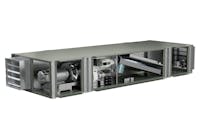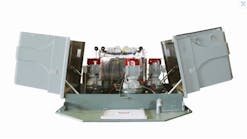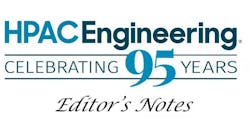My company was commissioning a hospital expansion in South Carolina. The hospital was being expanded from five to 12 stories, and elevator towers were being added on its ends.
The new mechanical systems were located in a 12th-floor penthouse mechanical room. Some of the new systems were steam-to-hot-water converters for the variable-air-volume boxes' hot-water reheat. The new hot-water converters served the sixth through 12th floors and the new elevator towers from the first through the fifth floors.
During construction, temporary polyvinyl-chloride (PVC) piping was placed to allow system recirculation on the ends of the piping runs. The PVC piping was specified for overflow and drains, but not hydronic piping. These pieces were “removed” after recirculation mode.
During startup and prior to testing, the system was operating at about 120°F. For commissioning, the system was heated to 180°F in 10°F increments. When the system was heated to approximately 170°F during testing, a call came over the radio to turn off the hot-water system. A flood was occurring on the fourth floor in the elevator-tower area.
The pumps were turned off in the penthouse, and the steam valves were shut. Water was coming out of the ceiling, ceiling tiles were falling, and water was coming down the stairwells and elevator shafts. The floor had an isolation valve, but it was located on the riser, not near the leak.
The culprit was a PVC line that had been left behind in the hot-water piping. The PVC pipe was removed, the system was restored, and all repairs were made. PVC piping usually has a limit of 140°F. The temperature limit had been exceeded.
Lessons learned: Inspect pipe prior to insulation, and do not allow any PVC piping in a hot-water system (even if it is temporary).
Dean McLane
Affiliated Engineers Inc.
Gainesville, Fla
Send “war stories” of 400 or fewer words to the attention of Scott Arnold, managing editor, at [email protected]. Authors are paid $50 per published war story.








